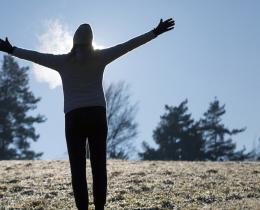Omega: You are the founder and director of the Hard & the Soft Yoga Institute. What is the significance of that name?
Beryl: The name comes from a Zen proverb, "Only when you can be extremely pliable and soft, can you be extremely hard and strong." I saw it in a book in the 1970s when I lived in Fraser, Colorado, and the temperature was about 20 or 30 below. My car didn’t start. I was hitchhiking into town to try and find someone to help me start my car and my friend, John, stopped on #40 and picked me up. He had a book on his front seat, and it was on Zen, and I just happened to open to that page, and I saw that proverb, and it just hit me.
I thought, "This applies to everything we do in life—I can use that name forever." Wow! I kept thinking, "Isn’t it true that every decision we make in life is finding that balance between sukha and sthira, between easy and comfortable (sukha) and steady and strong (sthira), or really, we could say between two of the yamas—ahimsa (nonviolence), the 'soft' element, and satya (truth), the 'hard' element."
Ahimsa, or nonviolence, without the balance of truth, can get you run over. If you just surrender to everything, you’re like Jell-O that never sets, or pancake batter on a cold grill. It just drips all down the sides. Satya, or truth by itself, without the balance of non-harming, can be a really powerful weapon. Truth is hard and strong. You need the balance between non-harming and truth.
We’re always making decisions about when to surrender and when to stand firm. Some things are even worth dying over, but not everything is. Sometimes, it’s best to surrender and stand aside and let the wave go by. How do we know which choice to make? The Buddhists say that the answer to right action comes out of skillful means.
How do we develop skillful means? Skillful means come out of practice. The more regularly you practice, the more skillful you become at knowing what the right action is in any given moment, and how much "soft" and how much "hard" to put into any decision.
Omega: What motivates you to keep showing up on your mat and maintain a commitment to yoga that spans decades?
Beryl: It works!
Omega: Do you think it’s necessary for people to adapt their yoga practice as they age?
Beryl: Everything in the world of form changes. Why would we expect that our yoga practice would not change? One of the causes of our collective suffering is that we expect that which is impermanent, to be permanent. It comes as such a shock when we realize we can’t do what we used to do, whether it is in asana or anything else. Why would you want to, in any case? And that’s just the changes on a physical plane.
Yoga practice is a living, breathing, organic, conscious being, and it moves and flows and shifts and adapts and transforms as we do. It should keep up with the times and help us keep up with the times. If it’s not malleable, it’s not yoga.
You’re going to do what you can for as long as you can. Astanga yoga, the 8 limbed path (not necessarily the asana practice by the same name), is meant to enhance our lives and increase longevity.
I still hike and swim. I’m still an avid swimmer. I swim with a master’s team. I’m just starting to learn how to cross-country ski. I fall down all the time. Most people at age 75, if they’re falling, are freaking out. I think yoga has kept me pliable and able to galumph around without too much worry.
But one thing is definitely true: No matter how much yoga you do, you’re still going to get old, get sick, and die.
Death is inevitable, and the goal is to have a good death, and stay healthy for as long as you can. If someone can still do this or still do that pose, I mean, that’s great. If you can’t, then you do what you can do. But each body is different.
I always tell people, "Don’t be looking around to see what other people are doing, whether it's on your mat or in the world."
When you are on your mat or on your cushion, you shouldn’t even know who is practicing next to you if you’re really doing practice. If you’re focused on where you’re going and what you’re doing, you’re too busy to look to the left and right and see what other people are doing.
How do you know if you’re supposed to work for the water, the wolves, the wildlife, the hungry children, or gun control? There’s so much work to do. It’s hard to believe there’s unemployment! Finding your dharma comes out of paying attention to your inner voice.
Once you find your dharma, you realize that there’s something in the world that you alone are supposed to do with this life. No one else can do it. It’s uniquely yours to do. You just have to do the work, and get on with it, as your contribution.



